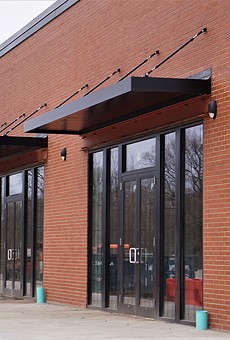By the time Scott Denhart started looking for a place in the Rochester area to start a brewery, he'd already developed an idea of the type of space he wanted. He'd visited breweries across the country and had decided that a warehouse-style space would best suit his needs.
At first, he looked in the City of Rochester and even found a couple of potential location, but they didn't work out. A transplant to Rochester and a Brighton resident, he'd become familiar with Fairport through visits to restaurants and attending some of the events in the village, including the popular and packed Fairport Canal Days.
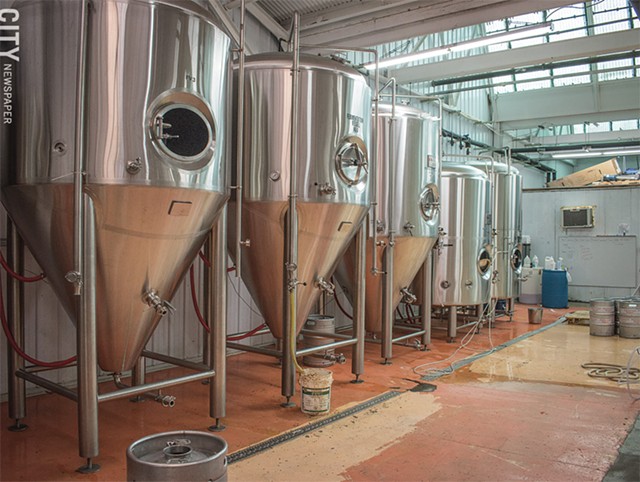
- PHOTO BY JACOB WALSH
- Triphammer Bierwerks has a 15 barrel brewing system capable of producing 6,000 kegs a year.
He started scoping out the village for potential brewery space and one day as he drove through, he saw the front of the American Can factory and a real-estate sign in front of it. He looked into the space and found out it was only available for sale; he wanted to lease. But he also knew Iron Smoke Distillery was already in the building, so he reached out to staff at Fairport Village Hall, found out who owned that half of the old factory, and he ultimately secured space right next door to Iron Smoke.
Denhart opened Triphammer Bierwerks in 2016 and the 7,900 square-foot brewery and tasting room now runs a 15-barrel brewing system capable of producing 3,000 barrels of beer a year, Denhart says. That's the equivalent of 6,000 kegs.
"The village was a definite plus," Denhart says. "This building with the tall ceilings and the interesting history was a definite plus."
But Triphammer's backstory is part of a bigger picture. The Village of Fairport has a history of food manufacturing, and the brewery is one of several small businesses that are re-envisioning and rekindling that past. The whiskey produced at Iron Smoke is part of it, as are the baked goods made by Amazing Grains and the coffee roasted by FairPour. Fairport Brewing Company started producing beer in the village in 2012, but recently moved its production to the City of Rochester; it still operates a very popular tasting room on South Main Street.
Historically, the village was home not just to the can company, but also to milling, distilling, and vinegar-making businesses, says Martha Malone, executive director of the Fairport Office of Community and Economic Development. The DeLand company, which long ago was absorbed by a bigger corporation, was one of the first baking soda manufacturers in the US.
Interestingly enough, the new crop of food manufacturing businesses in Fairport are, without exception, reusing the spaces built or once occupied by the old ones.
Triphammer and Iron Smoke may be joined in the can factory by a new, German-style brewery. It's part of a proposal to redevelop the front half of the building, which has a different owner than the back half.
FairPour's cafe is located in the Box Factory complex on Main Street, which used to be home to the DeLand company. Its coffee roasting and kombucha-making operations, as well as Amazing Grain's bakery and shop, are located in the Canal Works complex on Turk Hill Road, which once served as a warehouse for fruits and vegetables that were loaded onto Erie Canal boats.
"We have a unique inventory of properties, I believe, which offers opportunities for small-scale manufacturing spaces, for solopreneurs," Malone says.
On a summer Saturday, Amazing Grains bakes more than 1,200 loaves of its popular salty bread alone, says owner Lisa Wiggins. That figure includes loaves sold in its own store, at the Fairport Farmers Market, and through wholesale accounts, she says. And the bakery also produces other breads, cupcakes, pastries, cookies, and more.
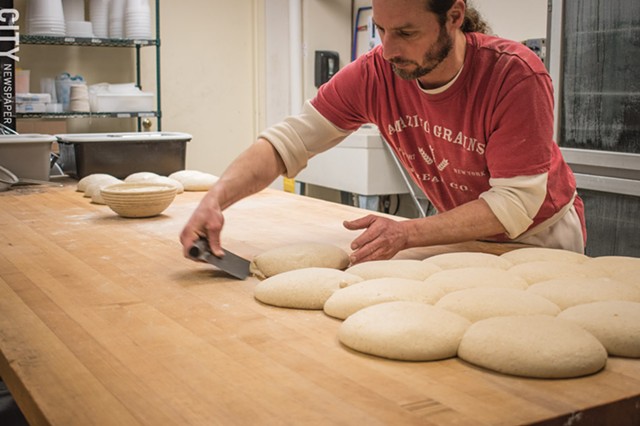
- PHOTO BY JACOB WALSH
- An Amazing Grains worker prepares bread dough.
Amazing Grains opened in January 2016, and at the time, Wiggins and her husband Brandon intended it to be a one-day-a-week thing. They wanted to start the business in Fairport, and they found a small, affordable space in Canal Works that had previously been a gluten-free bakery.
"We thought, 'It's perfect, a tiny little spot for one day a week for just the two of us,' so that's why we went there," Wiggins says. "It turned into something completely different."
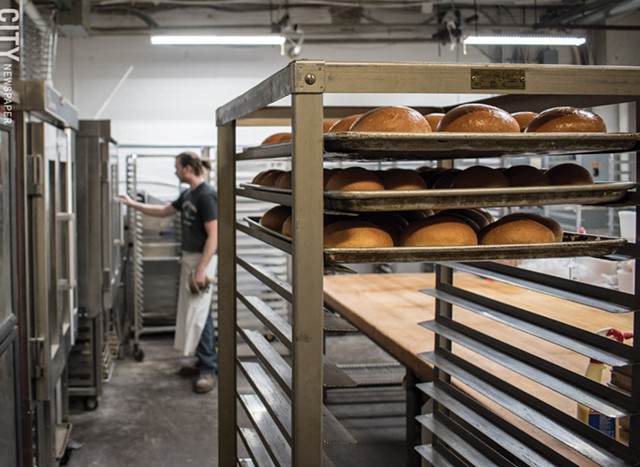
- PHOTO BY JACOB WALSH
- Fresh baked bread at Amazing Grains in the Village of Fairport.
Word of mouth – a powerful force in villages – helped the business grow quickly. It's now open Tuesday through Saturday and counts Oak Hill Country Club and the prestigious FLX Table restaurant in Geneva among its 80 wholesale clients. The business has already expanded its space once, and it plans to add on to the retail area this spring, Wiggins says.
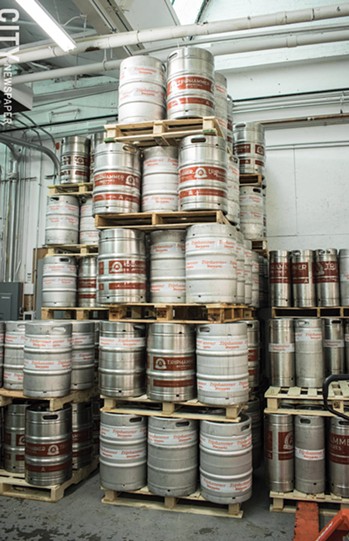
- PHOTO BY JACOB WALSH
- Kegs at Triphammer Bierwerks in the Village of Fairport.
FairPour is also looking to get into wholesale for roasted coffee and its own kombucha, both of which owner Mike Infarinato makes at the space in Canal Works. Its South Main Street cafe is selling its own brand of roasted beans – as well as coffee produced from them – and has its kombucha on tap at its South Main Street cafe. As Infarinato gets a better handle on roasting and ramps up kombucha production, he plans to hire someone to handle outside sales, he says.
He also plans to install bottling and canning machines for the kombucha and for nitro cold brew coffee.
Infarinato is growing the business in Fairport for a several reasons. He sees demand for locally crafted products among the village community, especially younger people who've moved to the village after living in the city. But he says he's also encouraged by the collaborative spirit of village businesses, the support he sees from village officials, and the support he's received from FairPour's customers.
Fairport is " a community that really stands behind small businesses," Infarinato says.
Direct retail, it turns out, is important for FairPour and the rest of Fairport's new cluster of food producers. For Amazing Grains, retail customers help expose potential wholesale customers to the company's baked goods, and vice versa, Wiggins says.
Iron Smoke's spirits are available in liquor stores and bars across the region, but it opened its Watering Room last year.
For craft breweries like Triphammer, selling beer directly through tasting rooms is essential to the business's success. The brewery has a wholesale business, and it cans two of its beers for sale in stores; they're available in 15 counties between the Rochester and Buffalo and regions, Denhart says. But the profit margin for on-site pint sales is higher.
"It's almost needed, or if not, you have to sell a lot of beer," Denhart says.
But retail's success depends on getting people in the door.
Wiggins and Denhart both laud the many events in the village, which they say help boost Fairport's profile and their business. Triphammer's best days, sales-wise, have been during Fairport Canal Days, Denhart says.
The village's walkability, something prized by every part of the community, is also a major asset, they say. People who live, work, and visit the village often stroll around, which helps bring foot traffic into the businesses, they say.
Fairport Mayor Julie Domaratz says she expects walkability will be a big theme in a forthcoming update of the village's comprehensive plan, which will start later this this year. Comprehensive plans focus on communities' priorities and generally serve as a set of guiding principles for development and government decision-making.
Domaratz just started her term in January, but as she went door to door during her campaign, residents repeatedly spoke about how a walkable village was important to them. They want to make sure that the village remains easy to get around without driving, she says.
The village's Office of Community and Economic Development has also received state grants for some improvements along the canal, including boat slips, a boardwalk, and accessibility improvements along the southwest bank, as well as some changes to better connect Liftbridge Lane and the canal's northwest bank.
Fairport officials and businesses say that ensuring the village is a pleasant and interesting place to visit and walk around helps business thrive. And the "diversity of experience" offered by the different food and beverage businesses help to that end, Malone says.
Villages can't thrive just on bars and restaurants, Domaratz says. But she adds that food and beverage producers have their own niche. They're destinations, just as restaurants are, and they're manufacturers who are selling products beyond the village's borders, Domaratz says. In the process, they're creating a few jobs.
"Small business is really important to a village like this," Domaratz says.
